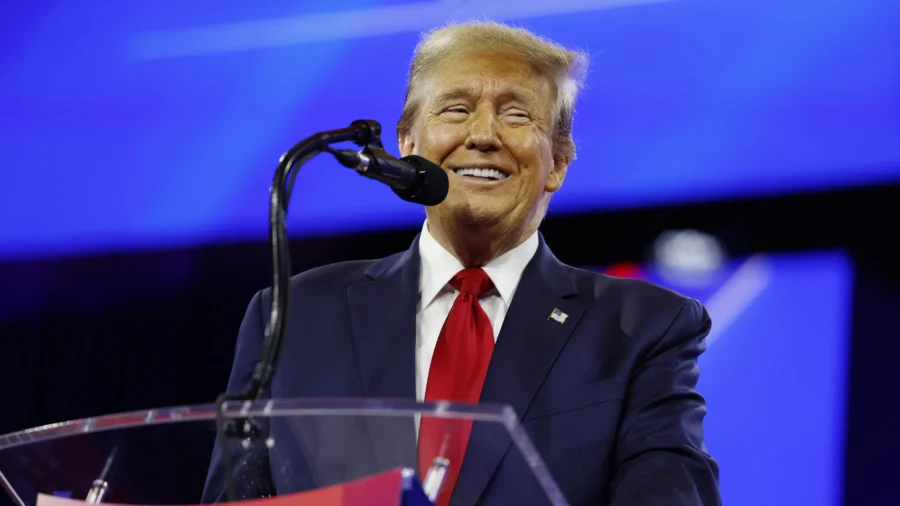Former President Donald Trump thanked the Supreme Court on Wednesday for agreeing to review the question of whether presidential immunity applies to a federal criminal case related to his efforts to challenge the 2020 elections.
“Legal scholars are extremely thankful for the Supreme Court’s decision today to take up presidential immunity. Without presidential immunity, a president will not be able to properly function or make decisions in the best interest of the United States of America,” the former president wrote on Truth Social.
President Trump reiterated an argument that both he and his attorneys have put forward: that an absence of presidential immunity would only invite partisan retaliation by opposing administrations and open former presidents up to prosecution for official acts.
“Presidents will always be concerned, and even paralyzed, by the prospect of wrongful prosecution and retaliation after they leave office,” he added.
The former president said that this could lead to extortion and blackmail of a president, who might face threats even before they leave office.
Court Grants Review
On Wednesday, the Supreme Court granted certiorari, or review, of a lower court’s ruling in the criminal case charging President Trump for his actions on Jan. 6, 2021.
President Trump faces four charges in this case. They include one count of obstructing the government, one count of conspiracy to obstruct the government, one count of conspiracy to defraud the government, and one count of conspiracy to violate the voting rights of Americans.
Escalating the case to the nation’s highest court, he filed a petition with Chief Justice John Roberts asking for a stay on all lower court proceedings, while special counsel Jack Smith asked the court to treat the petition as a request for review.
Per the new order, the request for a stay was dismissed as moot because granting review effectively does the same, halting lower court proceedings until the high court sends down its judgment.
Instead, the Supreme Court combined the various questions presented by the former president and special counsel.
The court limited the question that the parties may argue to: “Whether and, if so, to what extent does a former president enjoy presidential immunity from criminal prosecution for conduct alleged to involve official acts during his tenure in office.”
The special counsel argued that presidential immunity does not extend to criminal prosecution, while defense attorneys argue that a president’s official acts while in office are covered.
Presidential Immunity
The Supreme Court defined the concept of presidential immunity in a 1982 case, in which former President Richard Nixon was sued by a former military contractor who was fired, alleging that the president’s policies were to blame.
Presidential immunity from civil lawsuits was deemed “absolute” by the high court, which ruled that it extended to the “outer perimeter” of the office.
Such is the argument of President Trump’s attorneys, who say that his actions on Jan. 6 were within his official duties as a president who was taking election integrity seriously.
Meanwhile, the special counsel has argued that such immunity does not apply to those actions because what he is pursuing is a criminal and not civil case.
The issue of whether presidents have immunity from criminal prosecution has never been addressed by the Supreme Court, making it untested legal territory.
Road to the High Court
During lower court proceedings last year, President Trump had originally sought to dismiss the case based on presidential immunity.
These proceedings were originally heading toward a trial in the case on March 4, after being delayed for months.
Attorneys for the former president took the case to the appeals court after U.S. District Court Judge Tanya Chutkan rejected the motion to dismiss in December.
On Feb. 16, a federal appeals court rejected the presidential immunity defense and withheld its mandate on the condition that President Trump take the case to the high court by Feb. 12.
In its order on Wednesday, the Supreme Court directed the appeals court, “without expressing a view on the merits,” to “continue withholding issuance of the mandate” until the high court renders its judgment.
The appeals court’s Feb. 12 order bypassed the usual practice of an appellant seeking a rehearing by the full bench of the appeals court, which could have delayed the proceedings by a few more months.
From there, President Trump’s attorneys brought the case to the high court, asking for a stay of all lower court proceedings as they appeal the question of presidential immunity.
With the Supreme Court agreeing to review the case, oral arguments will be heard in the week of April 22. No specific date has been set at this stage.
The order specified the timeline for filing briefs and any amicus curiae briefs by March 19. Prosecutors must respond by April 8, after which President Trump can file a reply brief by April 15 before it goes to oral arguments.
Catherine Yang contributed to this report.
From The Epoch Times

